Today’s society is faced with one of the most difficult obstacles mankind has ever had to face. Greenhouse gas emissions from fossil fuel use are contributing to climate change that threatens the future of humanity and even the Earth itself. In the transportation sector, oil being used for gasoline is one of the most detrimental practices for the environment, but in a world so heavily reliant on gasoline, it is hard for any environmentally friendly alternatives to break through. However, renewable natural gas (RNG) is one of the most promising alternatives for helping society limit its methane emissions and gasoline usage. Clean Energy Fuels Corporation, a company valued at around $US 1.5 billion, is currently pioneering the way for RNG use by major shipping fleets. This company has the chance to both help save the environment and make a profit for themselves and their shareholders.
To understand why RNG is so promising, one must understand what exactly RNG is. RNG is a biogas. Biogas is a gaseous byproduct of decomposing organic matter. Biogas consists mostly of methane and carbon dioxide, both of which contribute to climate change.1 Under normal conditions, these biogases will escape into the atmosphere, adding to total greenhouse gas emissions. In producing RNG, however, biogas is captured and turned into either compressed natural gas (CNG) or liquefied natural gas (LNG), and used as a transportation fuel just like gasoline.2 This means that not only is there a profitable use for this biogas, but the methane and carbon dioxide are not released directly into the atmosphere. It is biogas capture that makes RNG a less carbon-intensive energy source. 3 Another important quality of RNG is that under ideal conditions, it can be viewed as a carbon-negative fuel source. This is because the process of making RNG captures and converts waste biogas (methane and carbon dioxide), and the resulting CNG or LNG is less carbon-intensive than the gasoline it replaces as a transportation fuel.4
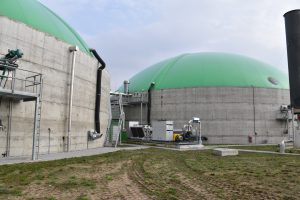
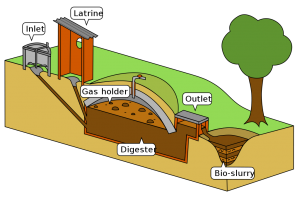
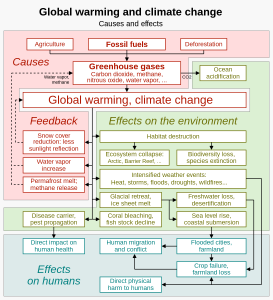
The company says, “Addressing climate change and reducing carbon has never been more urgent”. Their solution is by getting large trucking fleets to switch from gasoline to RNG.15 As discussed previously, RNG is mainly collected from landfills and livestock farms. The company pays livestock operations and landfill owners for the rights to build RNG-capturing domes above their land, providing them with a source of passive income. This is a unique business plan – for there to be RNG, there must be methane being released into the air and, as stated earlier, landfills and livestock operations account for a large portion of methane released into the atmosphere. Landfill and livestock owners are able to use the same practices and release the same amounts of methane, but because the gases are collected, they receive a payment for what would otherwise be waste. Clean Energy Fuels uses this biogas as their fuel product, and the company is able to make a profit on the RNG being sold. In this case, society gets the benefit from enjoying livestock products, the landfill and livestock owners benefit from the passive income, the company benefits from having a larger supply of RNG to sell to consumers, and total greenhouse gas emissions are reduced.16
This way of combating climate change differs from other methods in that it requires almost no change from the average consumer. In contrast, many other approaches often require significant lifestyle changes. For example, a common way of trying to combat climate change in today’s era is by going vegan.17 To make any real progress with climate change many people would have to go vegan in order to cause a large enough reduction in meat consumption to produce significant effects on greenhouse gas emissions. It is not enough for the individual to just not eat meat, they would also not be able to use any product that livestock is used to produce. An alternative to what might be a difficult lifestyle change would be the use of RNG. While RNG use would not compensate for all of the potential climate change effects associated with livestock production, such as deforestation, the process does eliminate or offset many of the associated greenhouse gas emissions.
Climate change threatens humanity as a whole, and it needs to be addressed immediately. As a potentially carbon-negative energy source and is the cleaner alternative to gasoline, RNG offers at least a partial solution to reducing greenhouse gas emissions. RNG use can minimize methane released by landfills and livestock production which is responsible for much of the United States greenhouse gas emissions. Clean Energy Fuels is the largest supplier of RNG in the world. They have pioneered a way for large-scale RNG production, and they continue to try to make the trucking industry less carbon-intensive, and therefore more sustainable. As the company says, “RNG is a proven solution that works”.
- “What Is Biogas?” National Grid Group. Accessed October 31, 2022. https://www.nationalgrid.com/stories/energy-explained/what-is-biogas. ↵
- U.S. Department of Energy. “Renewable Natural Gas Production.” Alternative Fuels Data Center: Renewable Natural Gas Production. Accessed September 5, 2022. https://afdc.energy.gov/fuels/natural_gas_renewable.html. ↵
- “How Sustainability Goals Become Reality.” Clean Energy Fuels, June 14, 2021. https://www.cleanenergyfuels.com/#why-rng ↵
- “What Is Renewable Natural Gas?: Socalgas.” SoCalGas, A Sempra Energy utility. Accessed November 13, 2022. https://www.socalgas.com/sustainability/renewable-gas/what-is-renewable-natural-gas. ↵
- Vasyatka1 “File:Gasag Biogas Plant in Schwedt (053).JPG – Wikimedia Commons,” March 30, 2017. https://commons.wikimedia.org/wiki/ File:GASAG_Biogas_plant_in_Schwedt_(065).jp g ↵
- U.S. Department of Energy. “Renewable Natural Gas Production.” Alternative Fuels Data Center: Renewable Natural Gas Production. Accessed September 5, 2022. https://afdc.energy.gov/fuels/natural_gas_renewable.html. ↵
- “How Sustainability Goals Become Reality.” Clean Energy Fuels, June 14, 2021. https://www.cleanenergyfuels.com/#why-rng ↵
- Tkarcher. “File:Biogas Plant.svg.” Wikimedia Commons, March 8, 2017. https:// commons.wikimedia.org/wiki/ File:Biogas_plant.svg. ↵
- “Renewable Natural Gas and the Need for Clean Domestic Energy Biomassmagazine.” Biomassmagazine.com. Accessed October 31, 2022. https://biomassmagazine.com/articles/19174/renewable-natural-gas-and-the-need-for-clean-domestic-energy. ↵
- “Climate Change Impacts.” National Oceanic and Atmospheric Administration. Accessed October 31, 2022. https://www.noaa.gov/education/resource-collections/climate/climate-change-impacts. ↵
- RCraig09 “File:20200118 Global Warming and Climate Change – Vertical Block Diagram – Causes Effects Feedback.svg.” Wikimedia Commons, January 18, 2020. https:// commons.wikimedia.org/wiki/ File:20200118_Global_warming_and_climate_ch ange_-_vertical_block_diagram_- _causes_effects_feedback.svg. ↵
- “History.” Clean Energy Fuels, July 7, 2022. https://www.cleanenergyfuels.com/about-us/history. ↵
- “Clean Energy Reports Revenue of $125.7 Million and 54.1 Million RNG Gallons Sold for the Third Quarter of 2022.” Business Wire, November 8, 2022. https://www.businesswire.com/news/home/20221107006190/en/Clean-Energy-Reports-Revenue-of-125.7-Million-and-54.1-Million-RNG-Gallons-Sold-for-the-Third-Quarter-of-2022. ↵
- “Gasoline explained: Use of Gasoline” Energy Information Administration. June 9, 2022. https://www.eia.gov/energyexplained/gasoline/use-of-gasoline.php. ↵
- “Our Sustainable Vision.” Clean Energy Fuels, June 4, 2021. https://www.cleanenergyfuels.com/our-sustainable-vision. ↵
- “How RNG Is Made.” Clean Energy Fuels, July 8, 2021. https://www.cleanenergyfuels.com/how-rng-is-made. ↵
- “Could Going Vegan Help Reduce Greenhouse Gas Emissions?” Stanford Earth. Accessed November 10, 2022. https://earth.stanford.edu/news/could-going-vegan-help-reduce-greenhouse-gas-emissions. ↵
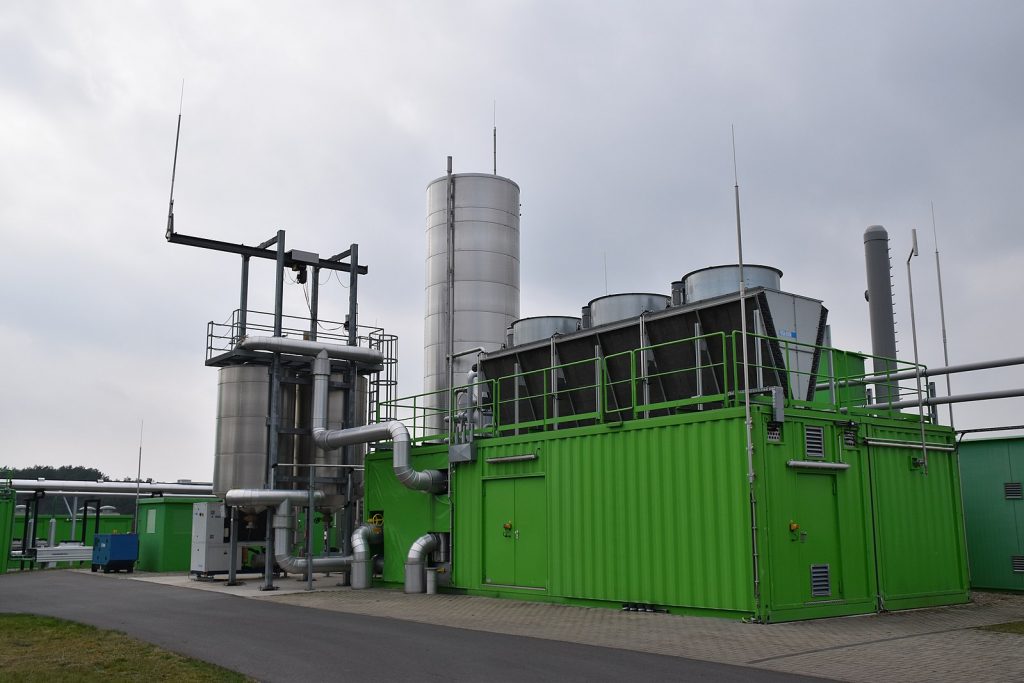
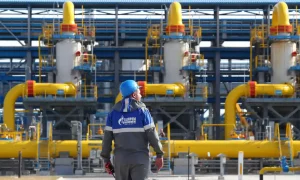

11 comments
Karly West
Fossil fuels are one of the world’s most unreliable resources due to the fact that there’s a limited amount of them. Once it’s gone, it’s gone. Not to mention the detrimental effects on the environment causing an increased risk of climate change and natural disasters. If the world used more renewable energy we would essentially be saving the environment for future generations. Hopefully, someday we graduate to a completely fossil fuel-free world. Great article!
Carolina Wieman
Fossil fuels have been the energy humanity relied on for thousands of years. Unfortunately, fossil fuels have detrimental effects on the environment causing an increase in climate change and contributing to landslides, earthquakes, and an increase in natural disasters. However renewable energy is on the rise. With its value coming up to around 1.5 billion dollars it is slowly becoming more popular. Solar panels, animal waste, and ocean waves are just some of the current natural energies being used. None negatively affect the environment nor create major increases in harmful activities, while also creating jobs.
Olivia Gray
This article was filled with lots of information and description which was really helpful. I really think climate change is a major problem and hurtful to the planet. Before this article I didn’t know anything about RNG. I learned that it can better our environment and reduce the risk of bad toxins getting released into our environment. This article reminded/ informed me of how important it is to be aware of this global issue in our world.
Alanna Hernandez
climate change has many people feeling doomed and hopeless as it’s impact will be felt no matter how much one bikes instead of drives. Articles like yours make it seem much more approachable and not so doomed with the solutions you provided(which include more vehicles running on RNG and mass companies switching over). Some really impactful stuff.
Hunter Stiles
Hello David! I would like to acknowledge the success of your article and to congratulate you on its completion. This is one of the articles that I feel left a sub conscious impact on me. I really liked the structure of your article and how in depth you went into the issue of carbon emissions.I love how instead of just providing a description of the issue of climate change you also provided a solution for it, the solution being RNG! Not only did you provide the solution but you explained it well. I also liked the picture incorporated into the article that displays both the causes and effects of global warming and climate change. I feel that by using that image you have reminded those who read this article that a lot of the time the causes are influenced by us only to also effect us and how we live in the end. It is just a good reminder to attempt to pull back on our contributions to such a global issue such as this one! Thank you for sharing your work with us!
Isabel Soto
Congratulations on your article and on your nomination. I love how you have structured your article with information on the renewable natural gas revolution. I have to agree that climate change is detrimental to us and is hurting our planet. This was the best article to inform us about how climate change is affecting the world today. For me this article inform me on this I did not know until reading this article.
Jocelyn Elias
Congratulations on your article and on your nomination. I do agree that climate change displays a really important and difficult problem to fix in our society especially since we’re so used to having it around and just living with it. I also really like that you provided solutions to this problem by mentioning renewable natural gas I think that it’s a great idea to start implementing it in our everyday lives when given the opportunity.
Dejah Garcia
What a great detailed article ! Congratulations on your nomination. I enjoyed reading you article because it was super organized and and talked about our futre with price statistics with renewable and natural gas companies. Overall this was a great and very interesting article. Again, congratulations best of luck 🙂
Ana Barrientos
Congratulations on your nomination! I would have to agree… climate change is detrimental to us and is hurting our planet. I liked the way you presented RNG as a way to reduce greenhouse gas emissions and how you explained why RNG is the best solution to this problem. I also enjoyed the images you provided, especially figure two. Overall, great job!
Helena Griffith
Because it felt so pertinent, this essay was really detailed and I enjoyed reading it. I liked that you chose a subject that directly impacts the state of the earth today and the consequences of greenhouse gas emissions. The decision to provide all price data to the renewable natural gas provider was wise. I also enjoyed how it had a bit of a persuasive piece feel to it. You began by identifying an important issue that people should be aware of and outlining potential solutions.